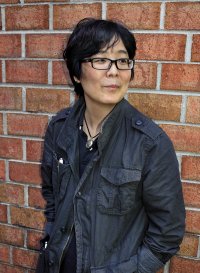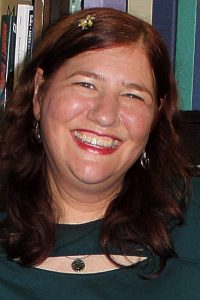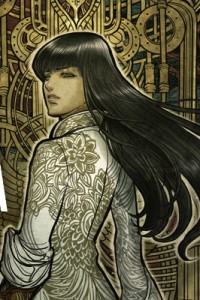Yoon Ha Lee: Axioms & Theorems

Yoon Ha Lee was born January 26, 1979 in Houston TX. His family moved back and forth between Texas and South Korea, where he attended high school at Seoul Foreign School, an English-language international school. He went to college at Cornell University, majoring in Mathematics, and earned a Master’s degree in secondary math education at Stanford. He has worked as an analyst for an energy market intelligence company, done web design, and taught math.
Lee began publishing SF with ‘‘The Hundredth Question’’ in F&SF (1999), and has since published more than 40 stories, including WSFA Small Press Award finalist ‘‘The Pirate Captain’s Daughter’’ (2009), Theodore Sturgeon Memorial Award nominees ‘‘Flower, Mercy, Needle, Chain’’ (2010) and ‘‘Ghostweight’’ (2012), and World Fantasy Award finalist ‘‘Effigy Nights’’ (2013). Many of his stories have appeared in Year’s Best anthologies, and several are gathered in debut collection Conservation of Shadows (2013), a finalist for the William L. Crawford Award. He also creates and writes games, most recently the browser-based game Winterstrike.
Lee lives in Louisiana with his husband and daughter.
Excerpts from the interview:
‘‘I originally wanted to be a composer. Then, in third grade, my teacher Mr. McCracken would change into a superhero costume, Story Man, and pretend to be a completely different person. I would say, ‘This is not real,’ and he would say, ‘You’re ruining the illusion.’ He had us do creative writing. Before that, I knew that everyone obviously composed music, because I composed music (though I learned later that was not actually the case), but I didn’t realize stories came from somewhere. Stories were these things that came in books, and books magically dropped into the library. They didn’t come from anywhere. Nobody made them. Mr. McCracken made me realize people wrote stories, and I thought, if people wrote stories, maybe I could write a story. I changed my mind and decided I wanted to be a writer instead of a composer.
‘‘I sold ‘The Hundredth Question’ to F&SF when I was in college, but I’ve been writing since third grade. I started submitting in sixth grade. Marion Zimmer Bradley received many of my efforts. As you may imagine, some of the stories were really terrible. Some of them I still have. But my parents divorced, and my dad remarried a woman who threw out all my stuff. I think of it as cleansing the world of really bad stories. I kept everything my sister salvaged from that situation. I’m not going to throw it out now. Between sixth and eighth grades I wrote my first novel. It was terrible Teenage Mutant Ninja Turtles fanfic. I took Leonardo’s name and wrote it backwards, and that was the name of one of the characters. I thought I was so clever. It was a terrible novel, but I only have a 5,000 word snippet of it, because all the rest of it got thrown out.
‘‘I was going to write fantasy – I was really into Dragonlance and the Anne McCaffrey’s Pern stories. I know they are technically science fiction but they had dragons in them. I wrote a total ripoff of Anne McCaffrey when I was in fifth grade, except it was unicorn riders instead of dragon riders. I know. Then I read Ender’s Game. I have lots of objections to Orson Scott Card’s political views, but at the time I didn’t know any of that. I was in a tiny school library in South Korea and we only had access to a limited pool of English-language books, let alone SF and fantasy books. I read Ender’s Game and realized I wanted to write about military ethics. I was always interested in military history. I would clean out the books in the library on trebuchets and claymores and siege engines.”
…
‘‘I approach writing like it’s an equation. What is the… moral is maybe too loaded a term… but what is the thing at the end that the reader should come away with? What is the final conclusion? What is the theorem that I am trying to prove, and what are the axioms that will get me there, and how do I show the steps? I often wonder if my math professors would approve of what I’m doing with what they taught me, because it’s something I learned as a math major, how to think in that manner. A lot of people think that math is about computation, or arithmetic. It’s not just arithmetic, it’s about argumentation. It’s about forming an argument. Certain kinds of stories, especially if you write didactic stories, are a kind of argument too. You can transfer the methods from math to fiction.”
…
 ‘‘For my collection Conservation of Shadows, my editor Sean Wallace at Prime said, ‘Send me your list of the stories you think will work best together.’ He made his own list, and when we compared them, they were almost the same. We went with his list, because I figured he is the experienced editor, so I would defer to his expertise. I’ve seen reviews of the collection. My favorite review was on Goodreads, where someone thought the first three stories were the first three chapters of a novel. They were all excited, thinking these characters would come together and interact. Then they figured out that it was a short story collection, and they were very disappointed.”
‘‘For my collection Conservation of Shadows, my editor Sean Wallace at Prime said, ‘Send me your list of the stories you think will work best together.’ He made his own list, and when we compared them, they were almost the same. We went with his list, because I figured he is the experienced editor, so I would defer to his expertise. I’ve seen reviews of the collection. My favorite review was on Goodreads, where someone thought the first three stories were the first three chapters of a novel. They were all excited, thinking these characters would come together and interact. Then they figured out that it was a short story collection, and they were very disappointed.”
…
‘‘I sometimes feel like readers have certain expectations because I’m an Asian-American writer. I got one Amazon review where it said that the stories had an Oriental flavor of seeking harmony instead of more traditional Western style conflict resolution. I’m like, ‘Really?’ I have pretty much not read Korean literature. I grew up with the folktales. I wouldn’t say Korean folktales are hugely different from Western folktales. There is a Korean version of Cinderella that goes pretty much the same way. The tiger stories, the seductive fox ladies. But yeah, he was talking about how conflict resolution was toward something that’s harmonious rather than logical. That’s not what I was trying to do, but if you see it, you see it. I sometimes wonder if that reader had seen those stories but with a non-Asian name on them, would they have seen the same things?”
…
‘‘I have a couple of ideas for what’s next. I’m sure my agent wants to know. I want to write a combat system based on musicology and music theory. Given my usual difficulties in explaining things clearly, this may not be the best idea. I like to compose as a hobby. People will tell me they’re really impressed that I compose, but composing is not hard. It’s like anything else, you have to practice it. Composing well is hard, but it’s hard for everyone. You have to practice until you are good at it. Everyone has an opinion about music, as they know what kind of music they like. They can hum along to things, they can find the beat. They have a relationship to music but not necessary a technical vocabulary to go along with that. The interesting challenge would be to do the space combat system in a way that the language would be approachable without going into really technical musicology terminology. Even though I like musicology. It’s still in development. I haven’t done more than exploratory work. I get bored easily. People think I am being ambitious with all these weird ideas, but the truth is I get bored, so I want to do something different from what I did before. People will ask me, ‘Will you ever write a sequel to Story X?’ I’ll think, ‘Not on your life!’ I don’t want to go back because I said everything I wanted to say. I want to go on and do something new. The trilogy was odd because I had something I wanted to say after the first book. I broke the world and thought, well, there are consequences to doing that, so maybe I can break some different things.’’






If Yoon Ha Lee is interested in the interface between music and science fiction, she should read Lloyd Biggle.